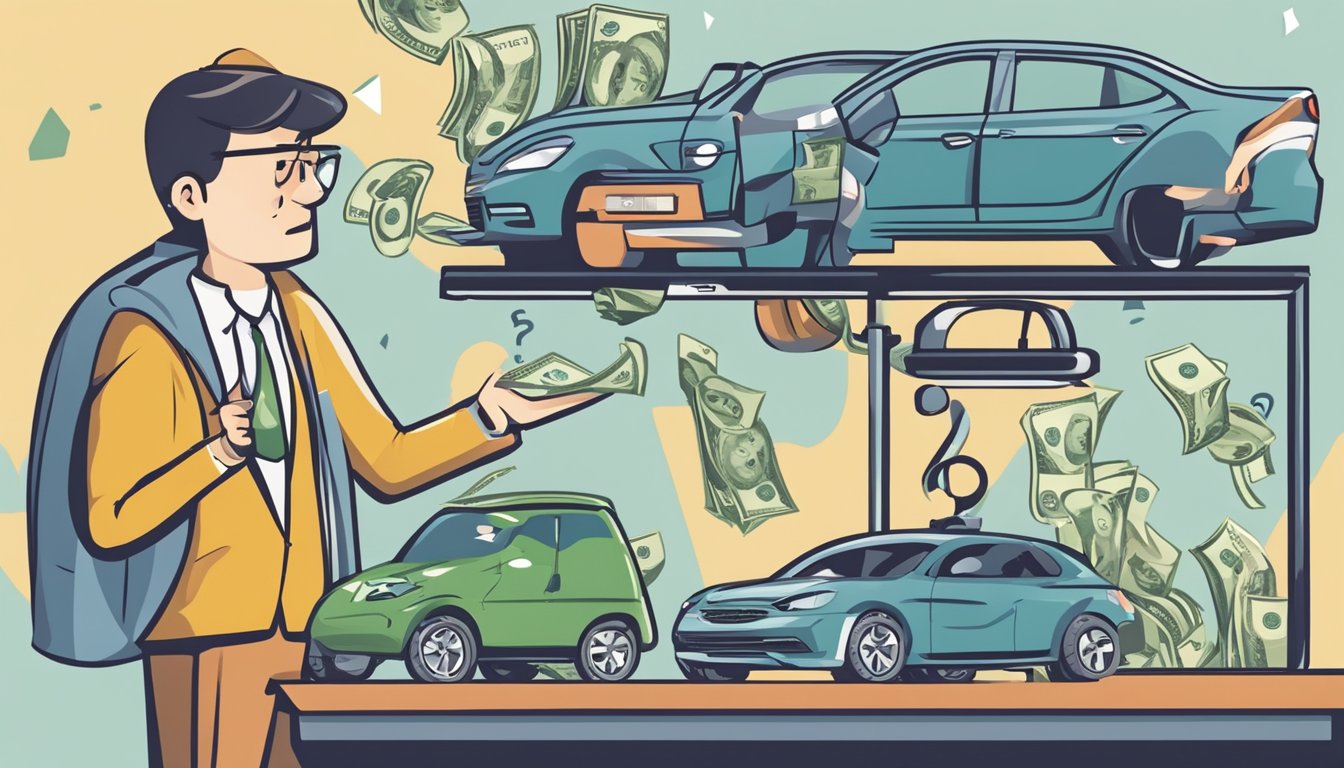If you’re planning to buy a car, you might be wondering whether a personal loan or a car loan is the best option for you. Both loan types have their pros and cons, and understanding the differences between them is crucial to make an informed decision.

Personal loans are unsecured loans that can be used for various purposes, including buying a car. They’re usually easier to obtain than car loans and offer more flexibility in terms of loan amount, repayment terms, and interest rates. However, they often come with higher interest rates than car loans, and the loan amount may not be sufficient to cover the full cost of the car.
On the other hand, car loans are secured loans that are specifically designed for financing a car purchase. They’re secured by the car itself, which means that the lender can repossess the car if you default on the loan. Car loans typically come with lower interest rates than personal loans and longer repayment terms, making them a more affordable option in the long run. However, they require a down payment, and the loan amount is limited to the value of the car.
Key Takeaways
- Personal loans offer more flexibility, but often come with higher interest rates than car loans.
- Car loans are specifically designed for financing a car purchase and come with lower interest rates and longer repayment terms.
- Understanding the differences between personal loans and car loans is crucial to make an informed decision.
Comparing Loan Types

When it comes to financing a major purchase such as a car or a home renovation, you have two main options: a personal loan or a car loan. Each loan type has its own advantages and disadvantages, and it’s important to understand the differences before making a decision.
Secured vs Unsecured Loans
One of the main differences between personal loans and car loans is whether they are secured or unsecured. A secured loan requires collateral, which is an asset that the lender can seize if you default on the loan. In the case of a car loan, the collateral is the car itself. This means that if you fail to make payments, the lender can repossess the car and sell it to recoup their losses.
On the other hand, personal loans are typically unsecured, which means they don’t require collateral. This makes them less risky for the borrower, but also means that the interest rates may be higher.
Interest Rates and Repayment Terms
Another important factor to consider when comparing loan types is the interest rates and repayment terms. Car loans typically have lower interest rates than personal loans, as they are secured by collateral. This means that you may end up paying less interest over the life of the loan.
However, car loans also have shorter repayment terms than personal loans. This means that your monthly payments may be higher, but you’ll pay off the loan faster. Personal loans, on the other hand, typically have longer repayment terms, which means you’ll have lower monthly payments but may end up paying more interest over the life of the loan.
Loan Amounts and Uses
Finally, it’s important to consider the loan amounts and uses when comparing personal loans and car loans. Car loans are typically used to finance the purchase of a vehicle, and the loan amount is usually based on the value of the car. Personal loans, on the other hand, can be used for a variety of purposes, such as home renovations, debt consolidation, or even a wedding.
When it comes to loan amounts, personal loans may offer more flexibility, as you can often borrow more than the value of the collateral. However, this also means that the interest rates may be higher, as the loan is unsecured.
Overall, when deciding between a personal loan and a car loan, it’s important to consider your individual needs and financial situation. A car loan may be a good option if you’re looking to finance the purchase of a vehicle, while a personal loan may be better if you need more flexibility in how you use the funds. Whichever option you choose, make sure to compare interest rates and repayment terms to find the best deal.
Understanding the Financial Implications

When it comes to financing a car purchase, you have two main options: a personal loan or a car loan. Both have their advantages and disadvantages, and it’s important to understand the financial implications of each before making a decision.
Credit Considerations
Your credit score plays a significant role in determining the interest rate you’ll be offered on a loan. A higher credit score generally means you’ll be offered a lower interest rate, which can result in lower monthly payments and less interest paid over the life of the loan. If you have a lower credit score, you may still be able to qualify for a loan, but you’ll likely be offered a higher interest rate and may end up paying more in interest over the life of the loan.
Assessing Lenders and Offers
When shopping for a loan, it’s important to compare offers from different lenders to find the best deal. Banks, credit unions, and dealerships all offer loans, and each may have different qualification requirements, competitive interest rates, and loan amounts available. You can use online auto loan calculators and personal loan calculators to get an idea of what your monthly payments might be for different loan amounts and interest rates.
Managing Your Loan Responsibly
Once you’ve been approved for a loan, it’s important to manage it responsibly to avoid defaulting on your payments. Make sure you understand the terms of the loan, including the interest rate, monthly payments, and any fees or penalties for early repayment. If you have a fixed interest rate, your monthly payments will stay the same throughout the life of the loan, which can make budgeting easier. However, if you have a variable interest rate, your monthly payments may fluctuate, which can make budgeting more difficult.
In summary, choosing between a personal loan and a car loan for financing a car purchase depends on your creditworthiness, credit history, and the approval process of the lender. A personal loan is typically unsecured and can be used for various purposes, while a car loan is secured by the vehicle and is used specifically for financing a car purchase. You can use online calculators to compare loan offers and determine which one is right for you. Remember to manage your loan responsibly to avoid defaulting on payments and damaging your credit score.
Frequently Asked Questions

What are the differences in interest rates between personal loans and car loans?
When it comes to interest rates, car loans generally offer lower rates than personal loans. This is because car loans are secured by the vehicle being purchased, whereas personal loans are unsecured. The interest rate on a personal loan is determined by factors such as your credit score, income, and repayment history. On the other hand, the interest rate on a car loan is primarily determined by the value of the car being purchased and the length of the loan term.
How does obtaining a car loan compare with securing a personal loan in terms of ease?
Obtaining a car loan is generally easier than securing a personal loan. This is because car loans are secured by the vehicle being purchased, which means that the lender has collateral to fall back on if the borrower defaults on the loan. In contrast, personal loans are unsecured, which means that the lender takes on more risk when lending money. As a result, lenders tend to have stricter requirements for personal loans, such as higher credit scores and income levels.
In what ways can a personal loan impact my eligibility for a car loan?
Taking out a personal loan can impact your eligibility for a car loan in a few ways. Firstly, having a personal loan can affect your debt-to-income ratio, which is a measure of how much debt you have compared to your income. If you have too much debt, lenders may be more hesitant to approve you for a car loan. Additionally, taking out a personal loan can impact your credit score, which is an important factor that lenders consider when assessing your eligibility for a car loan.
Why might one opt for a personal loan over a car loan when purchasing a used vehicle?
One reason why someone might opt for a personal loan over a car loan when purchasing a used vehicle is because personal loans can be used for a variety of purposes, whereas car loans are specifically designed for purchasing vehicles. This means that if you need to finance other expenses in addition to purchasing a used car, a personal loan may be a better option. Additionally, personal loans can have more flexible repayment terms than car loans, which can be beneficial if you need a longer repayment period.
What distinct advantages does a personal loan offer over car finance options?
One distinct advantage of a personal loan over car finance options is that personal loans can be used for a variety of purposes, whereas car finance options are specifically designed for purchasing vehicles. This means that if you need to finance other expenses in addition to purchasing a car, a personal loan may be a better option. Additionally, personal loans can have more flexible repayment terms than car finance options, which can be beneficial if you need a longer repayment period.
How do credit lines differ from personal loans in their usage and terms?
Credit lines differ from personal loans in a few ways. Firstly, credit lines are revolving credit, which means that you can borrow and repay money as needed up to a certain credit limit. In contrast, personal loans are typically a one-time lump sum that is repaid over a fixed period of time. Additionally, credit lines can have variable interest rates, whereas personal loans typically have fixed interest rates. Finally, credit lines can be secured or unsecured, whereas personal loans are typically unsecured.




